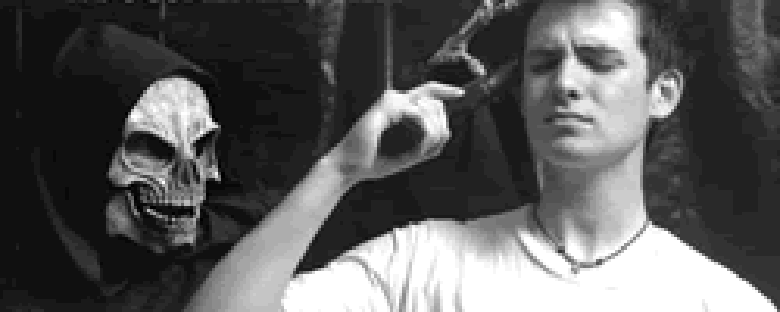Reviews
In a makeshift greenroom in the Trinity Church (in Cedar Hill, Texas) prosthetic wounds are applied to the face of a young man. He is a cast member, one of close to a hundred, who is performing in an annual Hell House. The event propagates scenes of abortion, rape, domestic violence, and other violent scenarios as a means of converting a Christian message. Its moralistic implications aside, it is a tactic (only because it is financed and held by a church) that involves a great irony: that the message warrants such questionable means, of which inducing fear is integral. Like legions of misogynistic, violent, and immoral horror films, Trinity’s tactic is to scare the hell out of you.
Hell House follows the tenth annual event during its three months of planning in chronology. We see introductory meetings concerning scripting, arguments over the color and position of a pentagram, and even blocking details of the controversial school-shooting scene — a vignette Trinity modeled within six months of Columbine. There are auditions and casting, which generate a lot of interest in local youth programs, yet, as director George Ratliff notices in a radio interview on the Plexifilm DVD, the “bad” parts are immensely more popular. “I think she’s going to try out for the abortion scene. That’s interesting,” says John Cassar, who encourages the audition of his teenage daughter, Alex.
There is much debate over particularities, such as the name of a popular date rape drug, crucial to the “rave scene.” Planners argue over the title of an interpretably occult role-playing game, whether it is “Magic” or “The Gathering.” These details may seem moot in comparison to the overall, propagandistic tactic of Hell House, though they illustrate the makers” lack of full understanding and even ignorance; simultaneously, it illustrates a stringent emphasis upon detail.
A number of Hell House’s participants have past episodes to relate to and draw from in their performances. A woman, cast in the popular “abortion scene,” speaks of the unexpected presence of her actual rapist in one night’s audience. It is an efficiently harrowing circumstance.
Upon viewing the film, the benefit or manipulation of Trinity’s Hell House (a perhaps unwarranted isolation, as several such Hell Houses are employed across the country) remains persistently questionable. It is a strength of a documentary to disregard available bias, especially as temptingly easy as it would have been with this premise. Ratliff’s topic is an objectively moral issue. He observes it with sympathy to a number of arguments, both for and against the discriminating tactic of Hell House.
We don’t do comments anymore, but you may contact us here or find us on Twitter or Facebook.



